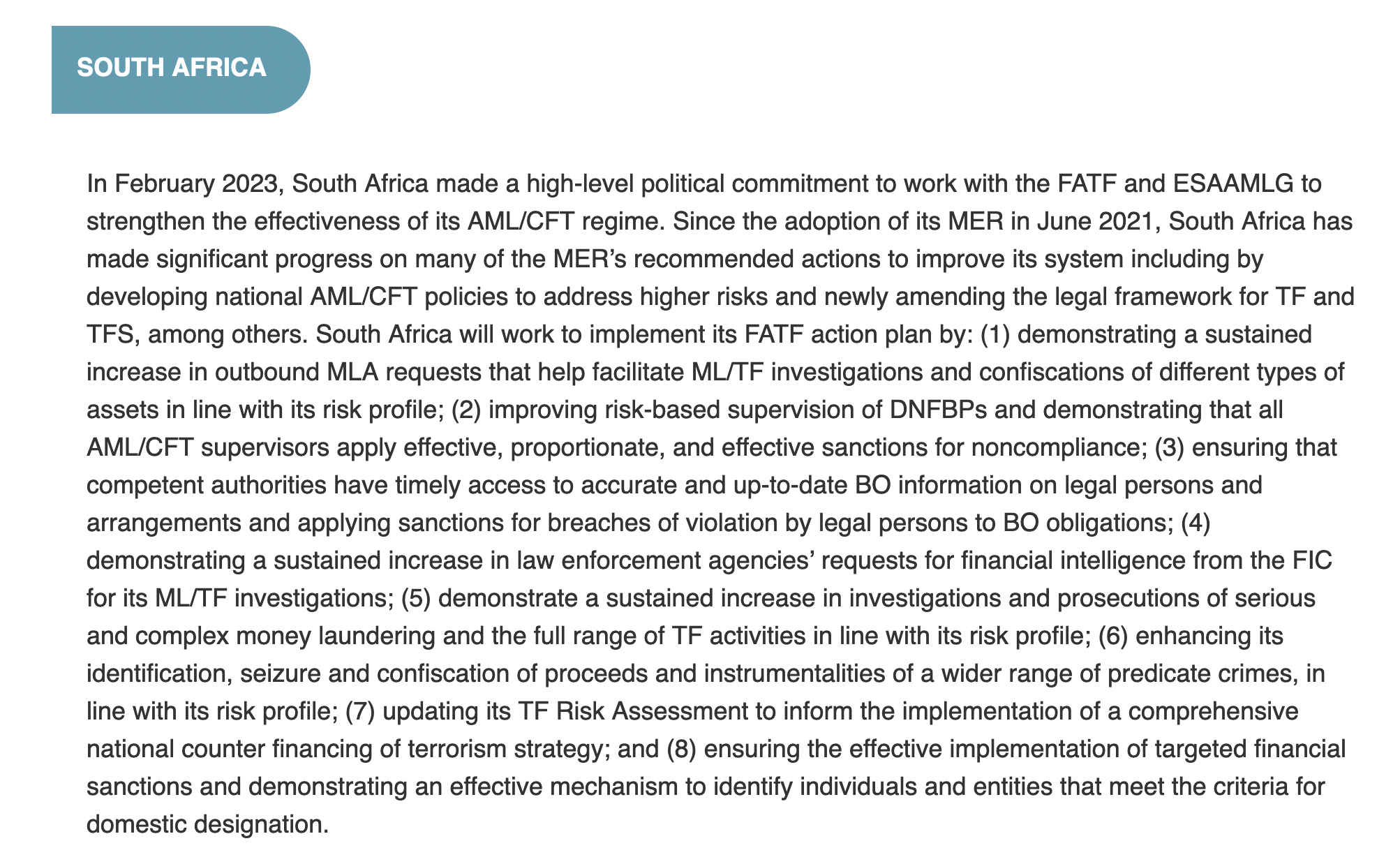
It's time to begin pushing back against the ghouls at FATF. They should not be able to restrict financial freedom while consolidating power among those who are the biggest facilitators of financial crimes.

Last week, the Financial Action Task Force decided to add South Africa and Nigeria to their “grey list” of countries that will need to implement more stringent surveillance on their citizens before getting the stamp of approval from the un-elected gaggle of ghouls who think they have the right to dictate how people around the world exchange money. Being grey listed will have a material affect on the ability of South Africa and Nigeria to raise capital from foreign investors. Even worse, it doesn’t seem like the move to the grey list was incited because FATF identified some money laundering activity that actually happened but because they were not happy with the lack of surveillance both countries have subjected their citizens to. It is extremely worrying that a supranational alphabet soup agency that was thrust upon the global populace without warning or proper cause is gaining this much influence over the financial systems of individual countries.
As we've stated numerous times throughout the years in this rag, anti-money laundering and know-your-customer laws do nothing to protect end consumers. The rules set in place have proven to stop 0.1% of money laundering transactions. At the end of the day, these data collection and storage rules wind up putting end consumers at risk of having their data stolen via a security breach, which causes more direct financial harm to individuals in aggregate. Throwing dragnet surveillance at a problem as nebulous as "money laundering" doesn't really make much sense.
Looking at every financial transaction in order to find crime doesn’t work.
— Kat Murti (@KatMurti) February 27, 2023
It’s like if police were looking for a murderer, so they stopped every single car on the road to check if anyone inside was a murderer.
- @KatTimpf #CatoEcon pic.twitter.com/vrv3aSrYU1
And as Representative Warren Davidson the "3rd party doctrine" that emanates from the Bank Secrecy Act isn't really something that was instituted in good faith and encroaches on the right to privacy every individual has as defined in the Constitution.
The Bank Secrecy Act helped create the flawed "3rd Party Doctrine" which claims that no one has an expectation of privacy when they share information - including information required to participate in the financial system. It was designed to exclude people and evade the… https://t.co/s2LhG8VkXT
— Warren Davidson (@WarrenDavidson) February 27, 2023
Yet for some reason or another, despite the fact that all AML/KYC guidelines that have been instituted over the last 50-years have failed to stop criminals from committing crimes, FATF and their lackeys in governments and well-established financial institutions around the world continue to double down on the incompetency. The doubling down should make it clear to anyone with two brain cells that these guidelines that almost always inevitably become manadatory by regulatory agencies aren't trying protecting consumers. They are an attempt to protect incumbents and consolidate power into the hands of a select few. It is much easier to control monetary, financial and payments systems when there are only a very small amount of players who can actually enter the arena becuase they have been grandfathered in or have the ability to pay for all of the legal fees that come with getting over the high bar of compliance.
And make no mistake, bitcoin is a threat to the incumbents' ability to maintain this type of control. Especially if more and more people continue to control their own private keys. It has been a little over a year since FATF dropped its guidelines for "digital assets" in which they expressed their intent to try to foist travel rule compliance on "unhosted wallets", which would make it so users have to share personally identifiable information about themselves when downloading a bitcoin wallet. I wholly expect the rhetoric to heat up around this topic in the coming years as bitcoin begins to become more mainstream. Luckily for us, it will not be possible for them to institute these guidelines in open source software projects. But make no mistake, they will try to do it and they will try to paint any of us pushing back on the insanity as "extremists".
That's when we hold up a mirror to the ghouls and remind them that the worst perpetrators of money laundering as FATF defines it are those who are the most "compliant". How much money has been laundered to contractors when war is waged? How was Jeffrey Epstein allowed to wire hundreds of thousands of dollars with no oversight after getting out of prison in 2013? Where is all the money US taxpayers have been sending to Ukraine going? Why did the Mexican cartels have teller windows at HSBC fine tuned for their briefcases full of cash? And why have the harshest punishments for those in the protected class been fines that pale in comparison to the profits made from crimes they facilitated?
It's time to begin pushing back against the ghouls at FATF. They should not be able to restrict financial freedom while consolidating power among those who are the biggest facilitators of financial crimes.
Final thought...
Had a norovirus bomb go off in our house over the weekend. Last night was traumatic.

